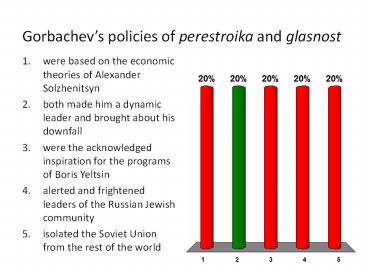Gorbachev - PowerPoint PPT Presentation
Title:
Gorbachev
Description:
Gorbachev s policies of perestroika and glasnost were based on the economic theories of Alexander Solzhenitsyn both made him a dynamic leader and brought about his ... – PowerPoint PPT presentation
Number of Views:320
Avg rating:3.0/5.0
Title: Gorbachev
1
Gorbachevs policies of perestroika and glasnost
- were based on the economic theories of Alexander
Solzhenitsyn - both made him a dynamic leader and brought about
his downfall - were the acknowledged inspiration for the
programs of Boris Yeltsin - alerted and frightened leaders of the Russian
Jewish community - isolated the Soviet Union from the rest of the
world
2
The 1991 coup in the Soviet Union
- had the cooperation of Mikhail Gorbachev
- was publicly opposed by Boris Yeltsin
- was led by pro-democracy elements in the military
- brought swift military support for Gorbachev from
NATO - dramatically slowed the pace of change in the
Soviet Union
3
Vladimir Putin
- made Chechnyan independence an important priority
of his administration - staged a coup and seized power from Boris Yeltsin
- has increased freedom of the press
- has virtually ended poverty in Russia
- centralized political authority in his hands
4
In the aftermath of the 1989 revolutions, Eastern
European states have
- alternated between authoritarian systems and
limited democracy - sought to integrate into Western European
political and economic structures - continued in political and military alliances
with Russia - seen little economic growth
- not yet joined the United Nations
5
Election results from East Germany in 1990
demonstrated that
- most people wanted to remain under communist
control - support for the communists had disappeared
entirely - voter apathy was just as prevalent there as in
West Germany - only a few radical reformers favored the process
of reunification - there was support for the unification policies of
the Christian Democrats
6
After the fall of Communism in Yugoslavia,
- Slobodan Milosevic sought to expel minorities
from his Greater Serbia - Albanians sought to expel ethnic Bosnians from
their provinces - the Dayton Accords brought an uneasy peace to the
Balkans until 1999 - all references to the Tito regime were erased
from school textbooks - Warsaw Pact nations were forced to intervene in
order to prevent genocide
7
The war in Kosovo
- began in 1991
- did not have the participation of the United
States - was eventually won by Yugoslavia
- was designed to ensure rights for ethnic
Albanians - brought immediate independence for Kosovo
8
Parti Quebecois campaigned in French-speaking
Quebec for
- secession from the Canadian Union
- separate trade agreements with the Canadian
National Government - separate trade agreements with the United States
- separate trade agreements with the French
Government - border control of the Canadian Great Lakes region
9
Agricultural subsidies were provided for many
European farmers through
- NATO
- NAFTA
- the UN
- the European Union
- the World Trade Organization
10
The end of the Cold War
- saw an end to most of the worlds major problems
- could have easily happened in the 1950s if the
United States had wanted it - left the world with only two superpowers
- was initiated by Mikhail Gorbachev
- did not occur until several years after the
disintegration of the Soviet Union
11
The September 11, 2001, attacks on the United
States were carried out by
- agents of the Iraqi government
- Palestinian terrorists
- Syrian militants
- members of al-Qaeda
- Afghani soldiers and supporters of the Taliban
12
After 1970, right-wing parties in Western
countries found a popular issue in the
- high costs of maintaining military defenses
against Communism - continuing American military presence on the
continent - large numbers of non-white immigrants flooding
into their countries - declining quality of health care and
environmental protection - rolling back immigration restrictions and
requirements
13
All of the following statements about Islam in
the early twenty-first century are true except
- Muslims were unsuccessful in their attempts to
establish communities in western Europe. - Fundamentalists called for a return to
traditional Islamic values. - Militant Muslims favored aggressive actions
against Western influence. - The Islamic population is growing in the western
world. - Some Muslims consider fighting the west as part
of the Holy Jihad.
14
Fundamentalism is a religious movement that
- is confined to Christianity
- struggles against many aspects of secular culture
- rejects all involvement in politics
- has been in decline since the end of World War II
- originated in response to the sexual revolution
of the 1960s
15
The global economy
- fosters globalization
- is essentially run by a handful of transnational
corporations - hinders the development of multiculturalism
- was more relevant in the 1980s than it is now
- has little effect on the Earths environmental
health































